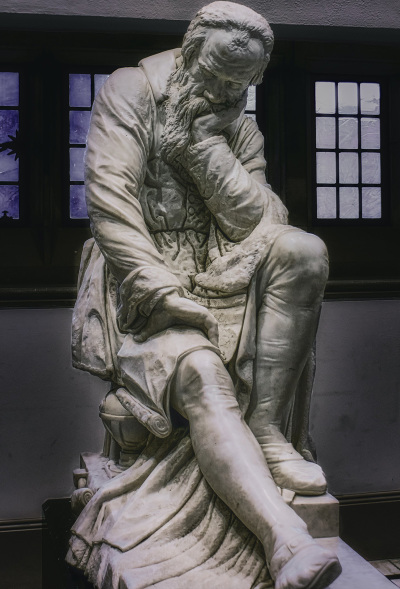
Classical apologetics is an approach that employs natural theology to establish theism as the correct world view. Classical apologetics addresses non-believers and their objections to Christianity with fundamentals and standard truth as the starting point. After God’s existence has been shown, the classical method moves to a presentation of the historical evidence for the deity of Christ and the trustworthiness of Scripture to show that Christianity is the best worldview. Classical apologetics is often referred to as the "two-step" approach. The classical approach to apologetics relies heavily upon the use of reason and philosophy. It tends to approach things from a very abstract and general perspective.
The first step of apologetics is to use natural theology to establish theism as the correct view. Second, after theism has been proven, the next move is to prove to the non-believers that Christianity is the best worldview.
Classic Apologetics
Some of the arguments of classical apologetics are the cosmological and teleological arguments. The cosmological argument attempts to prove that God exists by showing that there cannot be an infinite number of regressions of causes. In other words, there cannot be an endless number of causes that go back in time forever. God exists because there must be an uncaused cause of all things, and it is God. The teleological argument attempts to prove that a designer must exist since the universe and living things exhibit marks of design in their order, consistency, unity, and pattern.
Most classical apologists believe that the existence of God must be proven first. Thus, classical theism is composed of natural theology and Christian evidence. This school is called the “classical” method because the most prominent apologists of earlier centuries used this method. Other contemporary defenders of classical apologetics include William Lane Craig, R.C. Sproul, Norman Geisler, Stephen T. Davis, Richard Swinburne, and J.P. Moreland. Famous adherents of the classical approach from ages past include Augustine, Anselm, Thomas Aquinas, William Paley, and B.B Warfield.
Classical apologetics tries to prove that Christianity is reasonable, that faith is not in conflict with reason, and that faith is never a leap into the darkness. Classical apologetics also believes that Christianity is grounded in evidence, but this does not mean that every aspect of every Christian doctrine must pass the standard of reason to believe. In other words, they believe in the doctrine of the Trinity even though the doctrine of the Trinity does not pass the bar of "reason" in order to be accepted.
Classical apologists employ a constructive use of philosophy to make a case for Christianity. They also attempt to show that Christianity is consistent with science. Over the years, evangelical apologists accept certain aspects of Darwin’s Origin of Species.
Strengths of Classical Apologetics
One of the strengths of classical apologetics is that it strives to prove the reasonableness of Christianity. Classical apologetics willingly defends the integrity of the faith in Christ. I appreciate the works of classical apologists, and they are helpful resources for successful evangelism. The works of classical apologetics have impacted many believers over the years. I believe that God could use empirical evidence and reasonable arguments along with the gospel of Jesus Christ to change the hearts of sinners. I also think that the cosmological and teleological arguments are instrumental in evangelism.
Weaknesses of Classical Apologetics
Classical apologetics also has many weaknesses. First, classical apologetics fails to consider the noetic effects of sins, and some even ignore the sinful nature of unbelievers. The Scripture clearly states that unbelievers will suppress the evident truth in unrighteousness even though they know God (Romans chapter 1 verse 18). Many classical apologists also have neglected the power of the word of God and solely relied on their ability to reason. Classical apologists also do not understand that non-believers do not have an intellectual problem. The reason they don’t believe in Jesus Christ alone for salvation is not because they don’t see the empirical evidence. All of them have one problem, which is a moral problem. The mind of a non-believer cannot accept the truth of God because their hearts are wrong, and their minds are darkened.
One limitation of the classical apologetics is that it fails to recognize the holiness of God. The classical apologetics only proves the existence of God, but not the holiness of God. Because of that, many non-believers have the wrong concept of God, who is not the true God according to the Scripture. The non-believers only know that God exists, but they do not know that God is the Holy God, who will punish according to their sins. Classical apologetics also fails to realize that no matter how convincing the arguments are and how good the logic is, non-believers will not come to faith in Christ because they are dead in their trespasses and sins. First and foremost, they need the gospel of Jesus Christ. Therefore, it is far more useful to employ classical apologetics to demonstrate the reasonableness of Christianity and to present the gospel of Jesus Christ, which is the power of God unto salvation at the same time (Romans chapter 1 verse 16). Classical apologetics would be inefficient without the gospel presentation because only the gospel of Jesus Christ can transform the inner being of a person.

Dat Nguyen is a student at the Master’s Seminary and a member of Grace Community Church in Los Angeles, California. His desire is to be a faithful minister of the Word of God. He loves playing basketball and watching movies.